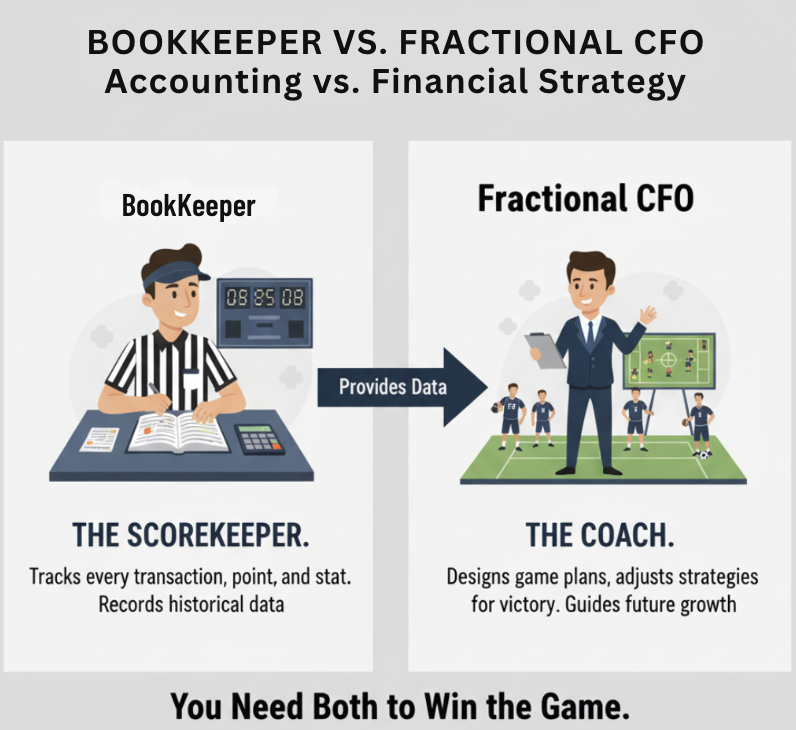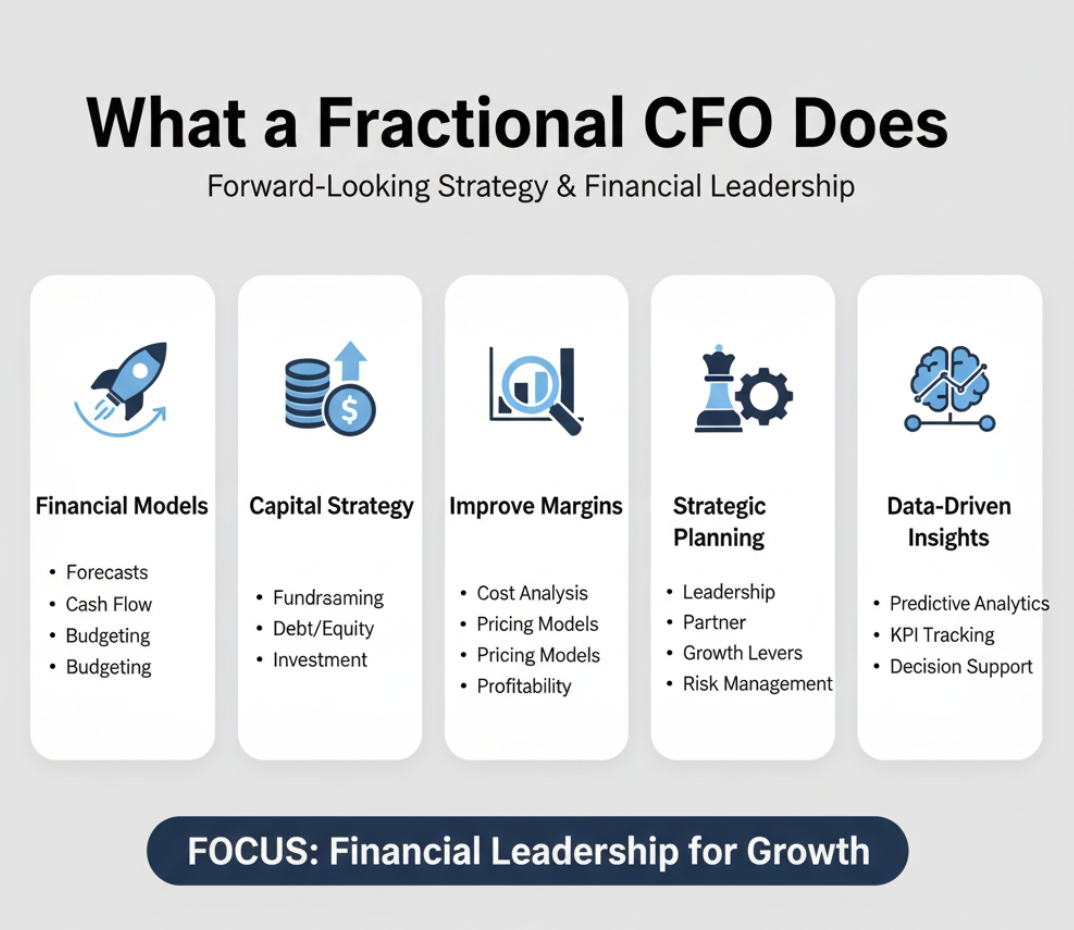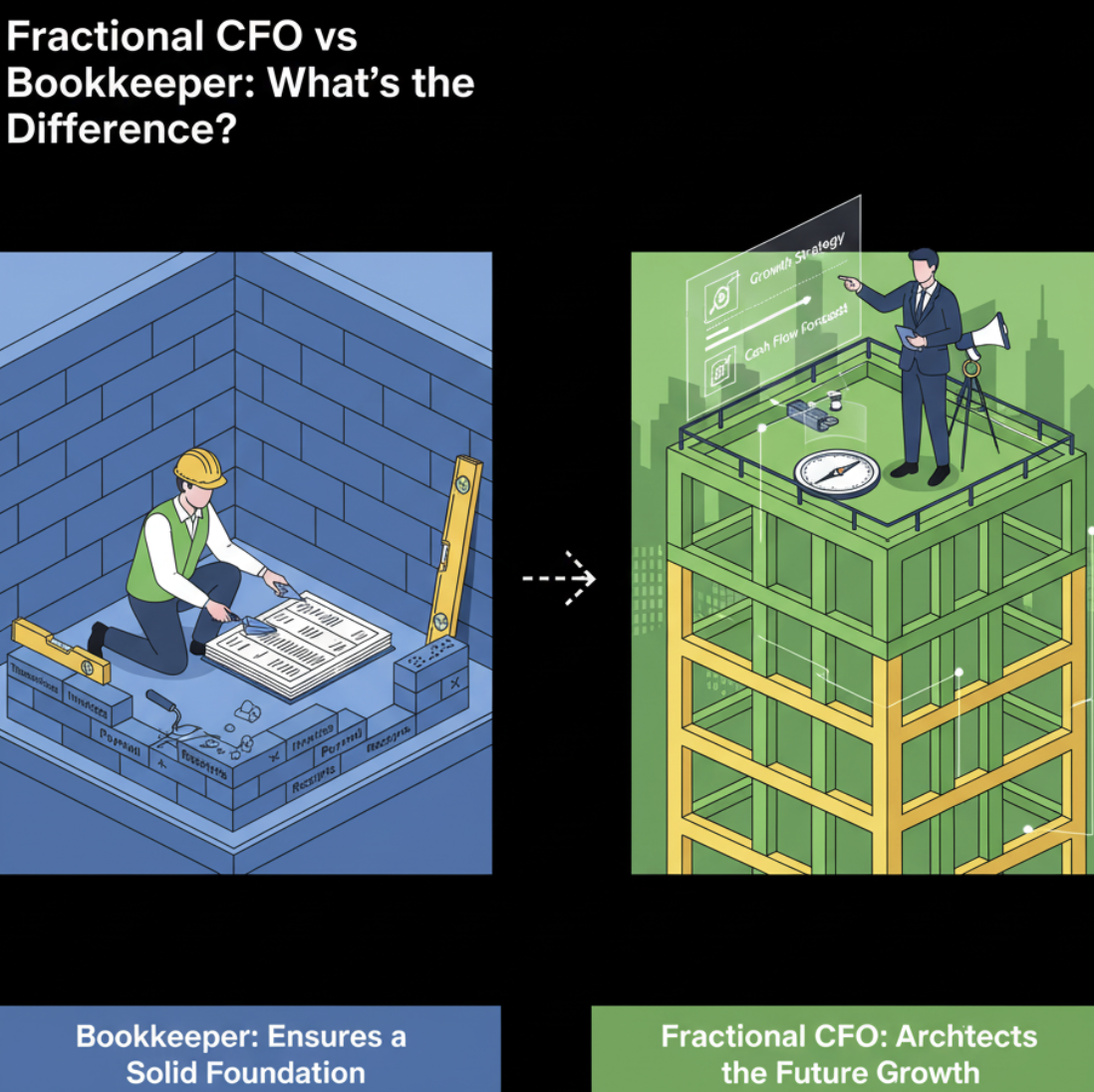Introduction
If you’ve ever found yourself wondering why your financial reports don’t quite help you make better decisions, you’re not alone. Many business owners struggle with the gap between day-to-day accounting and long-term financial strategy. This often leads to the question: Do I need a bookkeeper, or should I bring in a fractional CFO?
The short answer: you likely need both—but for very different reasons. Think of it like a sports team: your bookkeeper is the scorekeeper, tracking every point, foul, and stat. Your fractional CFO is the coach, designing the game plan, adjusting strategies, and guiding the team toward victory.

Fractional CFO vs Bookkeeper: The Core Differences
While both roles work with financial data, their scope, responsibility, and strategic impact are very different.
What a Bookkeeper Does
- Records daily transactions (sales, expenses, payroll, invoices)
- Maintains accurate ledgers and reconciles accounts
- Prepares financial statements such as balance sheets and P&L reports
- Ensures compliance with tax and regulatory basics
Focus: Historical accuracy and recordkeeping.
What a Fractional CFO Does
- Builds financial forecasts and cash flow models
- Advises on capital strategy (fundraising, debt, equity)
- Improves margins by analyzing costs and pricing models
- Partners with leadership on strategic planning
- Helps identify growth levers and manage risks
Focus: Forward-looking strategy and financial leadership.

When to Hire a Bookkeeper vs Fractional CFO
| Business Stage | Bookkeeper | Fractional CFO |
|---|---|---|
| Early stage | Essential for keeping books clean and tax-ready | Usually not yet necessary unless seeking outside investment |
| Growth stage | Still essential for accuracy | Critical for scaling, planning, and managing cash runway |
| Mature stage | Ongoing support | Key partner for acquisitions, exit strategy, or market expansion |
Analogy: Scorekeeper vs Coach
Imagine watching a basketball game without a scorekeeper—you’d lose track of points fast. But imagine a team with no coach—they’d lack direction, strategy, and the ability to win.
Your bookkeeper = scorekeeper. They ensure every number is recorded correctly.
Your fractional CFO = coach. They use the numbers to guide you toward long-term success.
How a Fractional CFO Adds Strategic Value
For SaaS, tech, and high-growth businesses, a fractional CFO can:
- Track ARR (Annual Recurring Revenue) and churn trends
- Optimize CAC (Customer Acquisition Cost) to LTV ratios
- Extend cash runway with forecasting
- Support fundraising with credible financial models
This is strategic financial leadership you won’t get from bookkeeping alone.
Leveraging AI for Finance and Operations
Modern fractional CFOs also bring AI tools into workflows:
- Automating reporting for real-time insights
- Using prompt libraries to analyze cash flow scenarios
- Leveraging due diligence checklists for acquisitions
👉 Explore tools like the Prompt Library or Business Playbook to streamline financial strategy.
FAQ: Fractional CFO vs Bookkeeper
1. What’s the main difference between a fractional CFO vs bookkeeper?
A bookkeeper ensures financial accuracy, while a fractional CFO provides financial leadership and strategy.
2. Do I need both a bookkeeper and a fractional CFO?
Yes—bookkeepers keep the financial foundation solid, while fractional CFOs help you scale and grow.
3. How much does a fractional CFO cost compared to a bookkeeper?
Bookkeepers are more affordable, but fractional CFOs—though higher in cost—deliver ROI through improved growth and strategy.
4. When should I hire a fractional CFO?
When scaling, fundraising, or managing complex financial strategy beyond bookkeeping.
5. Can a bookkeeper give financial advice?
Not typically. Their role is more about accuracy and compliance. Financial advice is a CFO’s domain.
Conclusion: Do You Need a Bookkeeper or a Fractional CFO?
If you want accurate records, hire a bookkeeper. If you want to make smarter financial decisions that fuel growth, engage a fractional CFO. And if you want both? That’s where NeoGig comes in.
👉 Hire a fractional executive today and gain access to experienced leaders who can take your business to the next level.







